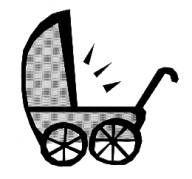On Breeding

During those meandering conversations with friends about aspirations for the future, the issue of having children often pops up. I usually reply that I have no intention of ever having children—a response occasionally echoed by my colleagues, but usually received with a mix of surprise and dismay. People probably assume that I’m an antisocial freak who thinks humans are callow, ugly, uniquely repulsive creatures, and that children are no exception. Okay, maybe that’s true at times. But in general, I think the human race, though lacking much of the grace and aesthetic appeal of other species, could be worse off.
Another reason not to have children may be that people like me don’t wish to settle down and lead quiet domestic lives with a pool in the backyard, a white picket fence and trips to Disneyland. But I’ve known families that exhibit unconventionality in many ways, from smoking pot in the kitchen to living in an East Village squat to having two parents of the same gender. Although we might not be used to it, there’s nothing morally objectionable to raising a kid with whichever harmless quirks one sees fit.
The main reason I’m sort of anti-procreation at this point in my life is ironically the most difficult to define. For most of my life I’ve been exposed to countless documentaries, textbooks and lectures about how wondrous it is we humans are able to create another living entity from the loins of two consenting adults. The concept of creating life, whether viewed as a miracle or as a civic duty, has colored every religious dogma and all aspects of civilization. Nonetheless, the process of multiplying, of creating more of two people and dispersing one’s biological legacy via carefully timed sex and cell division, is more amusing and disturbing than inspiring. I’m not sure why. Maybe it’s just my sardonic detachment from the commonality of nature that underlies our evolution. Maybe it’s a result of my contempt for the quaint balance we’ve stricken between primordial impulses and civility.
We ruin just about everything we touch, we enjoy wielding our intellectual powers to destroy each other, and the fact that people keep making babies is a stark example of how animalistic we still are, and yet how dangerous our nature is precisely because of that. At the upper crust of society, it seems almost egotistical and self-aggrandizing when privileged people conceive privileged children, whom they grace with a dangerous air of invincibility as well as narcissistic affection. And at the bottom, ordinary kids become an embodiment of the tacit, awkward wish that life might get a little better, even if it does take a generation or two. Transcending class, creed and culture, life is made the same way at every point in time, everywhere, borne upon parallel hopes that are at once selfish and earnest. The only difference is how each life is lived and how it is treated.
 The
dividing lines woven into the structure of society are a function of both human
intellect and the overwhelming individualism that we sometimes treasure,
sometimes loathe. There is always an
elite. Some people will be brighter or
more attractive than the rest, and everyone else can only be envious. Some will be healthier or happier than the
rest, and others will suffer physically and emotionally. It’s eerie to walk down the street and
observe the disparities. I see a group
of adolescents, one or two of whom are clearly the leaders—good-looking,
charismatic, overachieving, adored to the point of being quietly hated, while a
few others seem less lucky—ugly, socially inept, passively tolerated. I find myself accepting the covert
judgements that have established this social hierarchy and then grow angry with
myself for giving in to the petty attitudes that I hate with all my heart. From a larger perspective, some children
take riding lessons as their seemingly distant peers get their heads blown off,
are ravaged by abuse and intolerance, starve as leaders look on towards a
distorted vision of a greater good. As
I watch social-climbing, squeaky-clean MBA’s dash past old men slowly dying on
the street, I feel strangely indifferent, remarking to myself, “Hey, I guess
that’s life.” And it is. Right there before me. A mass of jumbled souls probing their way through
the universe, seeing where chance takes them.
Each of these lives began the same way, more or less, but with respect
to genetics, social status, strength and weakness, they were destined to be
swept in vastly different directions.
The
dividing lines woven into the structure of society are a function of both human
intellect and the overwhelming individualism that we sometimes treasure,
sometimes loathe. There is always an
elite. Some people will be brighter or
more attractive than the rest, and everyone else can only be envious. Some will be healthier or happier than the
rest, and others will suffer physically and emotionally. It’s eerie to walk down the street and
observe the disparities. I see a group
of adolescents, one or two of whom are clearly the leaders—good-looking,
charismatic, overachieving, adored to the point of being quietly hated, while a
few others seem less lucky—ugly, socially inept, passively tolerated. I find myself accepting the covert
judgements that have established this social hierarchy and then grow angry with
myself for giving in to the petty attitudes that I hate with all my heart. From a larger perspective, some children
take riding lessons as their seemingly distant peers get their heads blown off,
are ravaged by abuse and intolerance, starve as leaders look on towards a
distorted vision of a greater good. As
I watch social-climbing, squeaky-clean MBA’s dash past old men slowly dying on
the street, I feel strangely indifferent, remarking to myself, “Hey, I guess
that’s life.” And it is. Right there before me. A mass of jumbled souls probing their way through
the universe, seeing where chance takes them.
Each of these lives began the same way, more or less, but with respect
to genetics, social status, strength and weakness, they were destined to be
swept in vastly different directions.
 A
parent takes a chance, bringing a living thing into this world in hopes that it
will materialistically surpass (and thus glorify) its creator, or shatter
expectations and achieve fame or fortune.
For the most part, I admire people who take risks, but deep down, I
resent those who do so with another life.
Even when the situation appears stable and loving and perfect, it seems
self-absorbed. I can’t help suspecting
that the primal urge to procreate purely for the sake of furthering one’s
lineage is the real motivation behind all the cozy fluffiness of the upwardly
mobile suburban household. The
complacency of procreation, this eagerness to engender a better version of
oneself—even as the rate at which we are making the world a better place to
live is dwarfed by the rate at which we are populating it—seems perverse.
Behind all the cutesy of baby showers and bronzed shoes and name-choosing,
underlying the hype about genetic engineering and pro-life rhetoric, there is
an ambiguously savage aspect to creating a life. The aplomb of those who believe they’re lucky, that their
children will escape pervasive social ills, resonates with contempt for the
deprived—as if the hordes of unprivileged, ungifted children are just taking up
space in a society led by
A
parent takes a chance, bringing a living thing into this world in hopes that it
will materialistically surpass (and thus glorify) its creator, or shatter
expectations and achieve fame or fortune.
For the most part, I admire people who take risks, but deep down, I
resent those who do so with another life.
Even when the situation appears stable and loving and perfect, it seems
self-absorbed. I can’t help suspecting
that the primal urge to procreate purely for the sake of furthering one’s
lineage is the real motivation behind all the cozy fluffiness of the upwardly
mobile suburban household. The
complacency of procreation, this eagerness to engender a better version of
oneself—even as the rate at which we are making the world a better place to
live is dwarfed by the rate at which we are populating it—seems perverse.
Behind all the cutesy of baby showers and bronzed shoes and name-choosing,
underlying the hype about genetic engineering and pro-life rhetoric, there is
an ambiguously savage aspect to creating a life. The aplomb of those who believe they’re lucky, that their
children will escape pervasive social ills, resonates with contempt for the
deprived—as if the hordes of unprivileged, ungifted children are just taking up
space in a society led by
the elite. The wretched “masses” continue to “breed” all the same, of course, and then society wonders how they can be so cruel, so careless. But raising the next generation is a communal responsibility—one that we cheerfully ignore. If being human means anything, it is the ability to separate self-serving “goals” from the ideals that we halfheartedly champion but never truly understand. If humanity began to let go of its divisiveness and shortsighted materialism, maybe then procreation would be more than a blind, superficial biological process. Perhaps it could also become a compassionate investment in the future of human civilization.